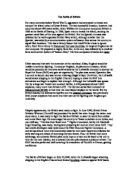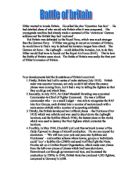Despite appearances, the British were ready to fight. In June 1940, British Prime Minister Winston Churchill had promised the world that even though his nation now stood alone, it was ready to fight the Battle of Britain to save the world from defeat and a new Dark Age. He encouraged his country to "brace ourselves to our duties, and men will say, ‘This was their finest hour.’" Fighter Command, led by Air Marshall Hugh Dowding, was ready, having been preparing for such an event since 1937. They had a well-developed radar system and the Filter Room at Fighter Command--a central operations room that coordinated observer and radar reports and allowed for early warning and attack of incoming German forces. Plus, the British had home advantage, as a downed British pilot could hop on a train and be back to his unit in time for the next mission, but a downed German pilot became a prisoner of war. The RAF had also performed well covering the evacuation of Dunkirk in France, gaining confidence.
The Battle of Britain began on July 10,1940, when the Luftwaffe began attacking shipping in the English Channel and limited missions against RAF bases. Although Germany suffered greater losses than England in this period (248 vs. 148), the British were quickly losing experienced pilots. On August 1, Hitler issued Fuhrer Directive No.17, which read: "I intend to intensify air and sea warfare against the English homeland...The Luftwaffe is to overpower the Royal Air Force in the shortest possible time." Operation Sea Lion officially began on August 8 with orders for intensified attacks directed at airfields and radar stations. Aldertag, originally planned for August 10 but delayed because of bad weather, was August 13. On that day, the Luftwaffe flew 1,485 sorties; losing 39 airplanes while the British lost 15. The Germans also knocked out a number of radar stations, shutting off the eyes of Fighter Command. Although most of these belonged to Coastal Command and the few that did belong to Fighter Command were repaired quickly, the Luftwaffe still maintained an edge for the next several days. Commander-in-chief of the Luftwaffe Reichsmarshal Hermann Goering made several adjustments in tactics and for the remainder of the month, the RAF, although winning on paper, was losing aircraft and pilots faster than it could afford. It was three weeks away from defeat.
But the RAF was saved by a simple mistake. On August 25, the pilot of a Luftwaffe He.111 became lost and accidentally bombed central London, despite standing orders not to do so. Churchill ordered a retaliatory strike on Berlin, sending 81 RAF Hampden bombers to Berlin the next night. Although the attack was ineffectual, it struck right at Hitler’s ego. He immediately gave a radio address, promising, "If the British bomb our cities, we will bury theirs" and, against the advice of his generals, issued orders to institute a merciless bombing campaign against London. On September 7, the London Blitz began. Initially, the bombing was during the day, but as Luftwaffe losses added up, it became a nighttime bombing operation.
Although difficult on the civilian population, the Blitz gave the RAF a much-needed break. Air bases and factories could be repaired and plane inventory could be replaced. With its increasing strength, the RAF continued to deal the Germans horrendous losses, until the Luftwaffe could no longer absorb the punishment. On October 12, Hitler officially canceled Operation Sea Lion and Great Britain emerged undefeated.
Germany could easily have won the Battle of Britain, but it committed too many costly errors. The German government failed to emphasize aircraft production and did not replace downed planes quickly enough. Adjustments to current production were not made to increase the airplane range, although auxiliary fuel tanks had been developed during the . A Messerschmitt Bf.109 had only enough fuel to remain over England for 20 minutes and bombers were often left unescorted. But most importantly, German military intelligence was deplorable. Its sources said radar stations were unimportant and should not be targets. It also misreported strength, weapons, and losses. At one point, Hitler complained to Goering that "you have apparently shot down more aircraft than the British ever possessed." The faulty intelligence resulted in poor strategy.
Fighting for its existence, the underdog British managed its campaign better. Under the supervision of the Minister of Aircraft Production, Lord Beaverbrook, resupply and maintenance became a national priority. Housewives donated pots and pans to be turned into Spitfires (it is unknown if the factories actually used the donations) and whenever a squadron needed a replacement airplane, it soon appeared.
The Fighter Command communication system helped save airplanes and the country as well. As the Filter Room received reports of enemy strength and location from radar stations and the Observer Corps, it sent out only the exact number of fighters needed to the exact location, sparing unnecessary sorties. And in a controversial decision, Dowding ordered Fighter Command to concentrate on attacking bombers going to the target and ignore all other German aircraft. His goal was to prevent German bombing from occurring but not to expose his pilots to unnecessary risks. As a result of this unpopular decision, as well as political battles below him, Dowding was forced to retire two weeks after the end of the Battle of Britain.
The citizens of London became used to the nightly bombings of the Blitz until the following May. But as inconvenient and harrowing as the bombings were, they did not complain because they knew that Fighter Command had saved them from invasion and defeat. In a speech before Parliament in August, Churchill remembered the brave men of the Fighter Command:
The gratitude of every home in our Island, in our Empire, and indeed throughout the world, except in the abodes of the guilty, goes out to the British airmen who, undaunted by odds, unwearied in their constant challenge and mortal danger, are turning the tide of the World War by their prowess and by their devotion. Never in the field of human conflict was so much owed by so many to so few. All hearts go out to the fighter pilots, whose brilliant actions we see with our own eyes day after day"
By Jennifer Sanders







